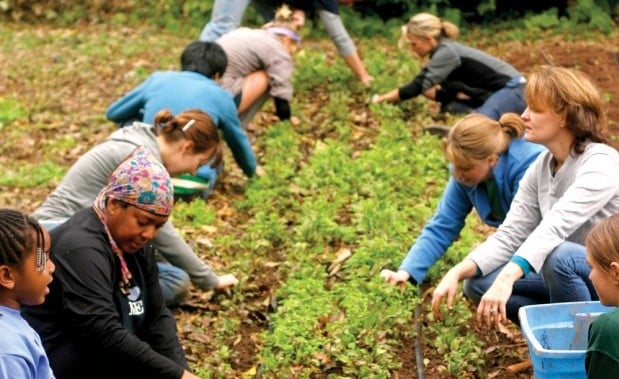Every Sunday morning, a group of metro Atlanta residents who call themselves Crop Mob drives to a different small farm in North Georgia to lend a hand. These people finish the day tired, covered in dirt and sometimes sunburned, but with smiles on their faces.
Farming experience is not needed, but a desire to work hard is. In a single morning, a group of mobbers can accomplish several weeks’ worth of work. The only thing Crop Mob asks for in return is that the volunteers be fed lunch.
“They want to get closer to the most important thing you can do — eat,” says Mike Lorey, a 28-year-old graphic designer and one of the founders of Crop Mob Atlanta.
Mobbers have planted and harvested everything from squash and sweet potatoes to garlic and greens. Because most sustainable farms avoid herbicides, volunteers also do a lot of weeding. Hoophouses, a modified greenhouse that allows for year-round growing, are also built. Mobbers tackle each task with surprising enthusiasm.
The original Crop Mob began a few years ago in the Raleigh/Durham area as a way for local farmers to strengthen their community and pool their labor. Last February, The New York Times ran a story that brought the idea to a national audience. Kimmy Coburn, a 27-year-old copywriter from Atlanta, happened to read this story.
Coburn teamed up with Lorey to launch an Atlanta chapter, and they planned their first mob. Last spring, about 50 people of various ages and backgrounds descended on the Glover Farm in north Georgia. By the middle of summer, the mobs, which are usually capped at 50 volunteers, were filling up in a matter of days. By fall, they were running out of space in hours. The chapter sends an e-mail to 383 addresses monthly announcing the next mob, and approximately 900 people follow the group’s Facebook page.
“There is this pent-up demand for people wanting to be able to help their farmers a little more,” Lorey says. “A lot of volunteers spend long hours at a desk and are looking for an escape.”
Crop Mob has spread as quick as kudzu in the South. In North Carolina alone there are now six chapters including two in the Research Triangle area. Virginia has four, including one in the Washington, D.C. area. South Carolina and Florida have two each, and Tennessee and Alabama can each claim their own chapter. In all, there are now 48 Crop Mob chapters in 27 states including one as far away as Hawaii. Some chapters only work on community gardens. Others, such as Crop Mob Atlanta, travel as far as people are willing to drive. Their dedicated action demonstrates the growing interest in sustainably produced food.
“I want to say it’s because I’m helping people, and it is, but that’s not what gets me up at six in the morning to go weeding,” Coburn said. “It’s because I have a good time.”








